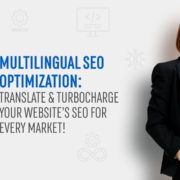Multilingual SEO: How to Translate and Optimize your Website for Different Countries
Let’s imagine the following scenario:
You’ve set up a website for your business in Germany and started offering your products in the German market.
Your business is growing rapidly, and after some analysis, you realize it’s time to expand into new markets. So, you conduct relevant market research and benchmarking and decide to target the French market, optimizing your website for French customers.
The first big question is: How do you make your website visible and searchable to French users? At first glance, the answer seems quite simple: create new pages, translate them into French, add local contact details, and start getting work orders from new clients.
Unfortunately, it’s not that straightforward in reality. When a company enters an international market, Multilingual SEO becomes an essential part of its marketing strategy. Here’s why:
- Your website is currently optimized for Germany, and simply adding French-only internal pages without proper technical adjustments won’t make them visible to French search engines.
- Translating content word-for-word without considering the cultural preferences of foreign customers won’t help your website rank high in search results.
This is why Multilingual SEO is one of the best practices when expanding into new markets.
Multilingual Search Engine Optimization (SEO) is the process of adapting a website’s content for different languages and regions.
According to SEO theory, to do this effectively, there are 4 key areas to focus on:
- URL structure
- Keywords
- Website speed and performance
- Backlinks
Now, let’s take a closer look at each of these.
1. URL Structure
When creating pages for another country in a different language, it is important to use country-specific domain extensions to optimize the website for local search engines.
For example:
www.janusww.de – for the German market
www.janusww.fr – for the French market
www.janusww.jp – for the Japanese market
While “.com” domains are widely used and can be registered anywhere in the world, many countries favor second-level domains (with two-letter country-specific extensions) for better local SEO.
2. Keywords
Translating content may seem simple, but SEO relies on matching content to user search queries by including specific words and phrases, known as keywords, in website copy. However, be cautious! Searches vary from country to country, and what is popular in one market may land you at the bottom of the search page in another.
For example, in the US, the keyword “language translator software” is very popular and has 8,100 searches per month:

(Source: Google Ads)
But in Germany, the translated term “sprachübersetzer software” only has 10 searches per month:

(Source: Google Ads)
This clearly demonstrates the importance of conducting thorough keyword research – analyzing and collecting all relevant keywords for your service or product in the target country – before creating and translating website content.
3. Website Speed and Performance
Beyond content, technical issues can affect your website’s performance, leading to slow loading times. Optimizing your website’s code for speed and reliability may involve:
- Removing broken links,
- Ensuring that all pages are indexed,
- Minimizing duplicate titles,
- Removing non-unique images, etc.
There are many other factors that contribute to improving website speed and performance.
4. Backlinks
Search engines in each country have specific criteria for ranking websites. Getting your website to the top of the search page is a challenging task: it requires both strong internal quality (error-free content, no broken links, unique material, etc.) and robust external credibility, measured by backlinks: external sources that link to your website. It is crucial for your brand to be well-recognized and to be referenced by many external sources. These can include maps, forums, online magazines, client websites, and more. The goal is to increase the visibility of your website by building quality links from other sites.
Boost your website’s international presence with Janus Worldwide
These are just some of the key factors in search engine optimization. If your company is looking to expand into international markets, Janus Worldwide can provide expert assistance in optimizing your website for top rankings in your target market. Learn more about our SEO Translation services here.
Janus Worldwide – Expertise is at the heart of everything we do






